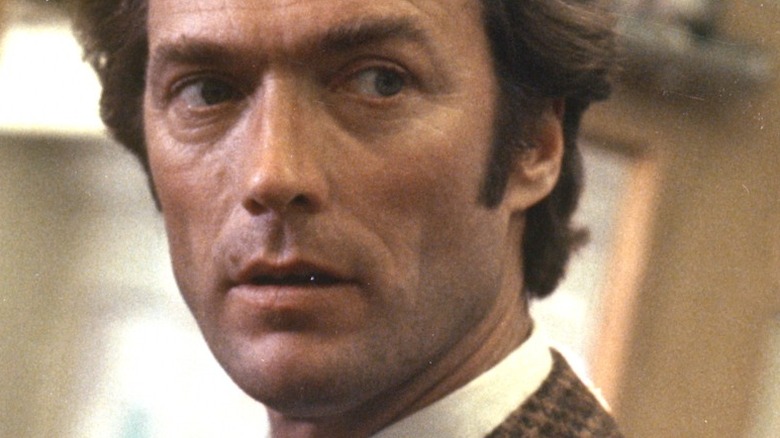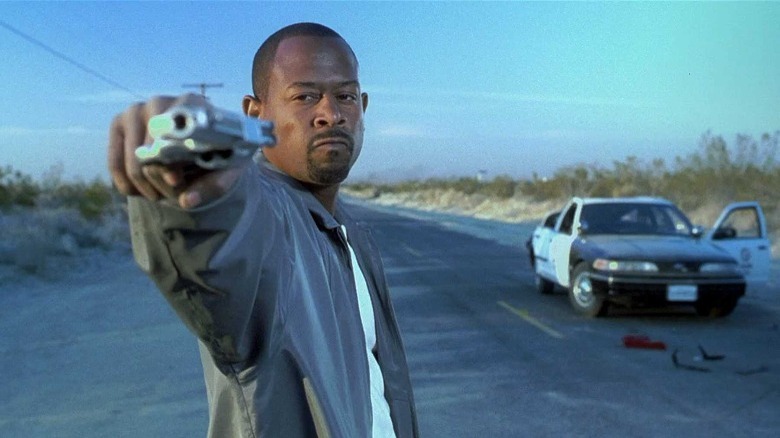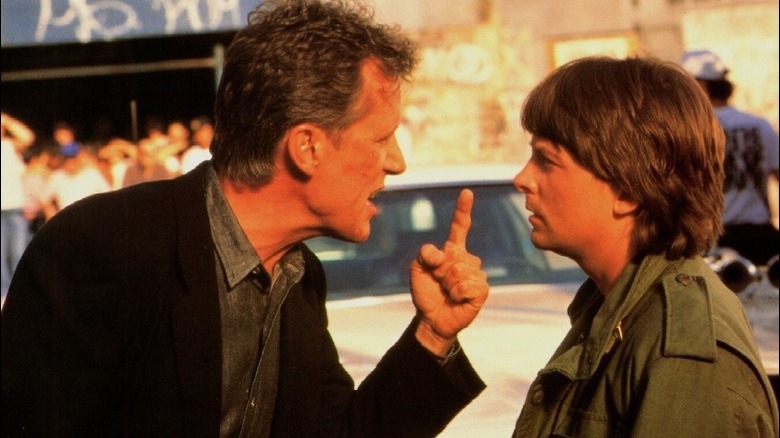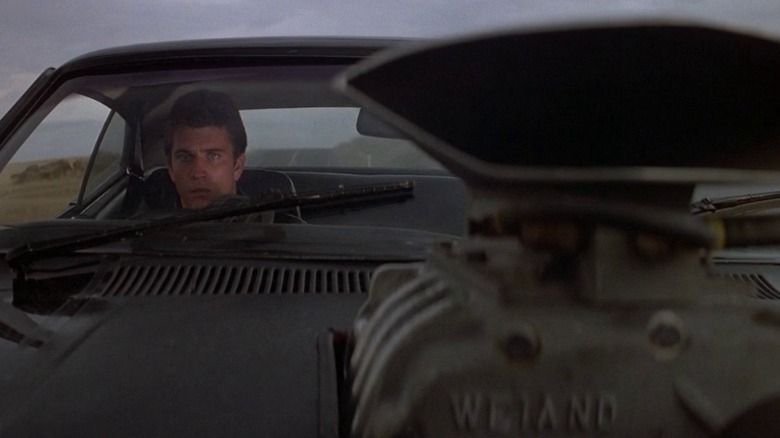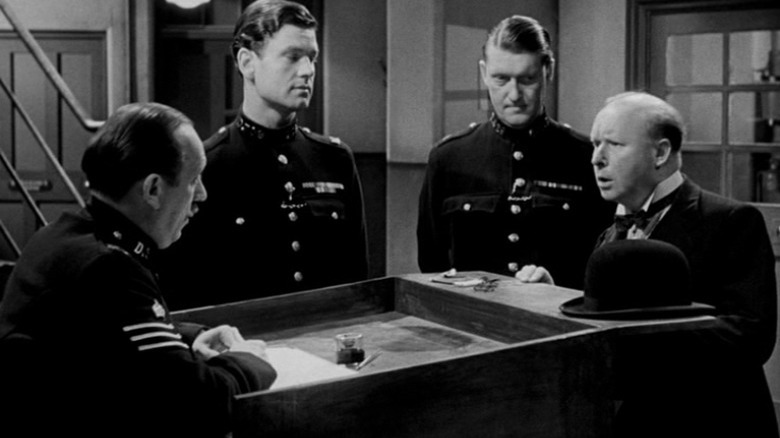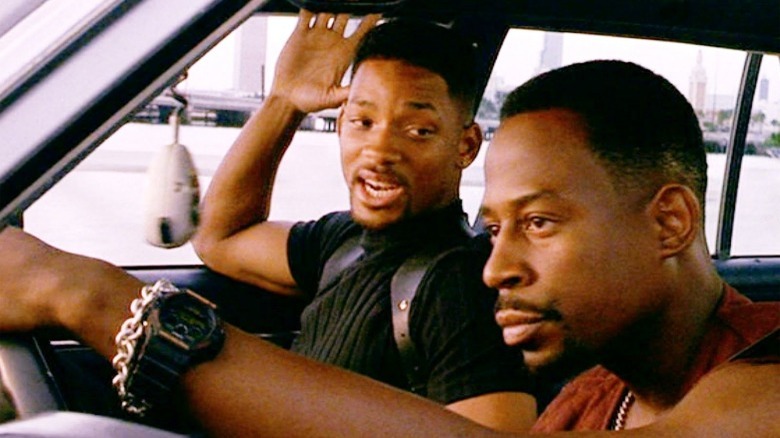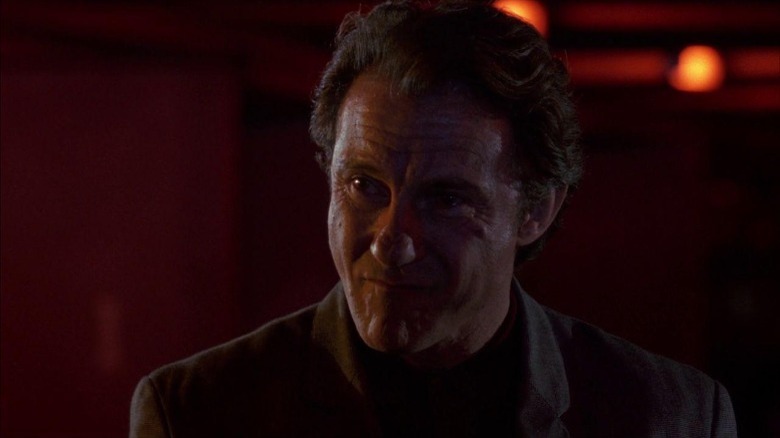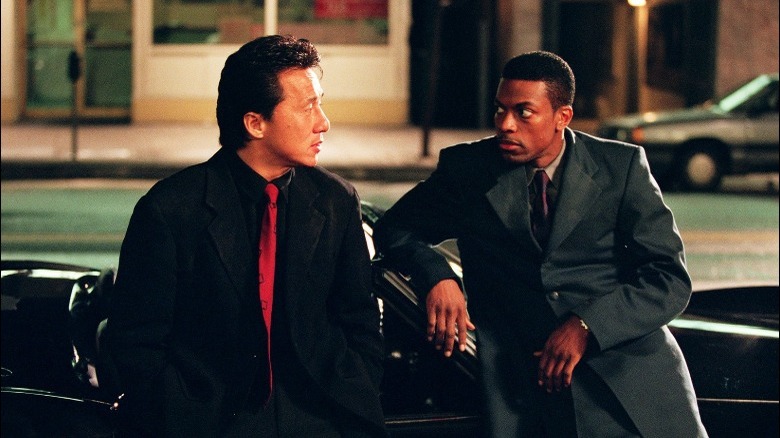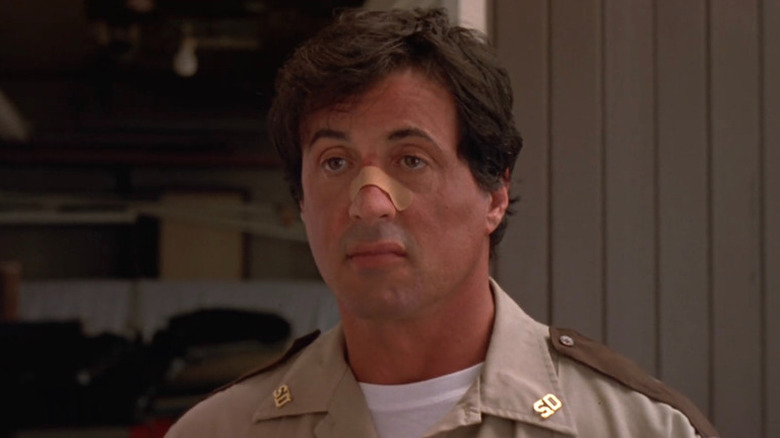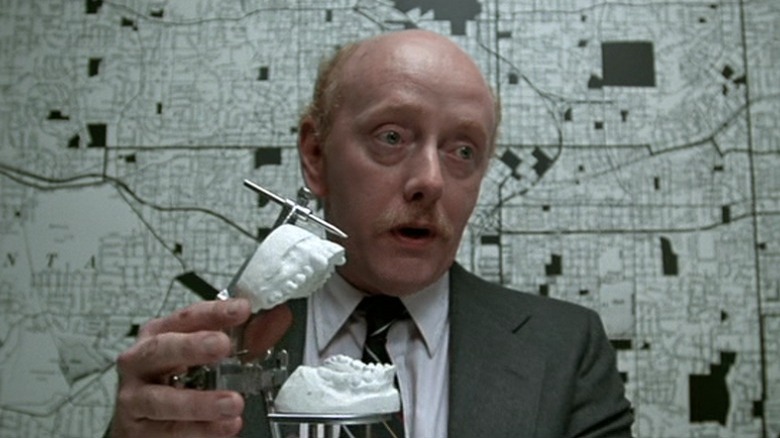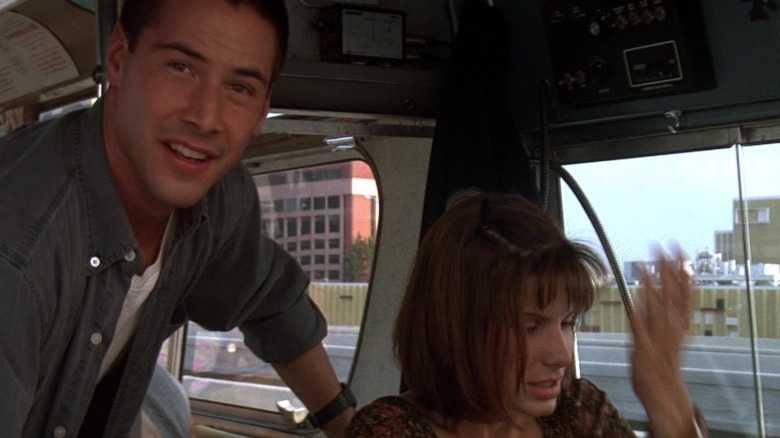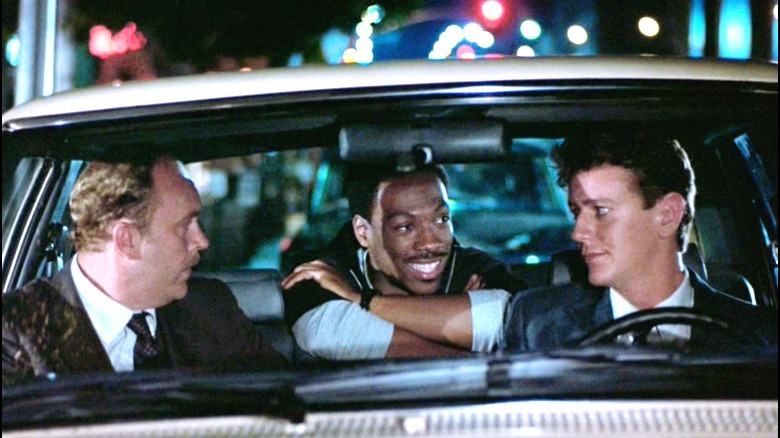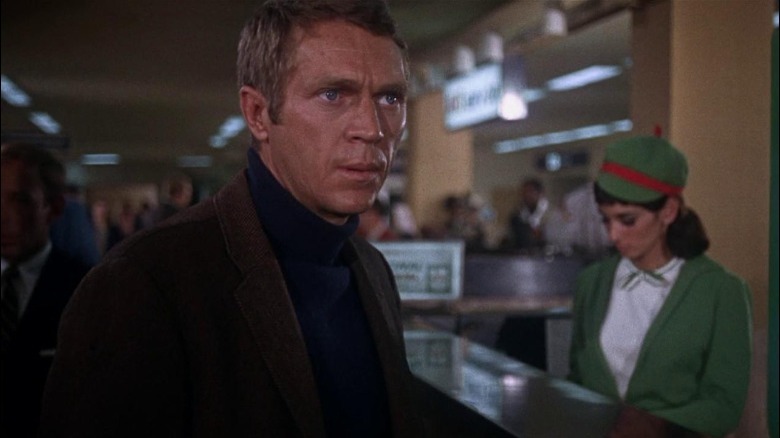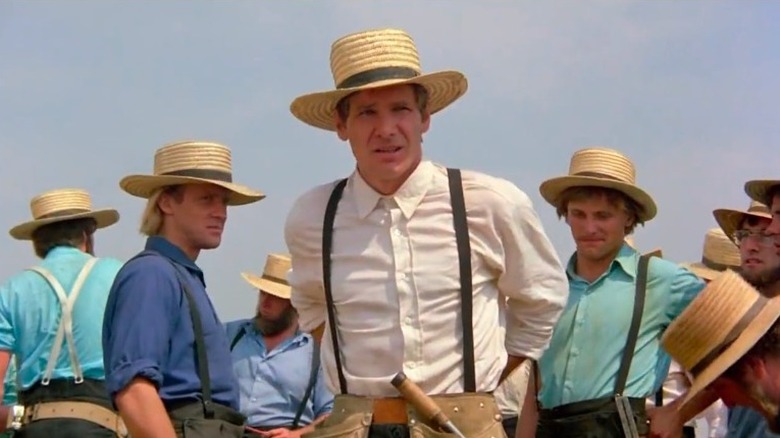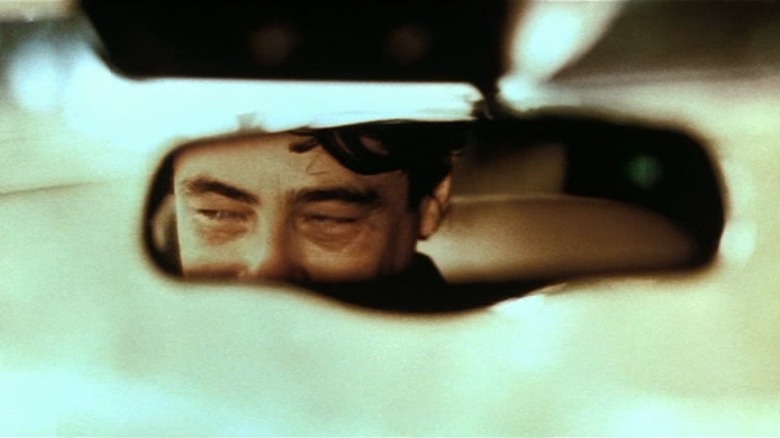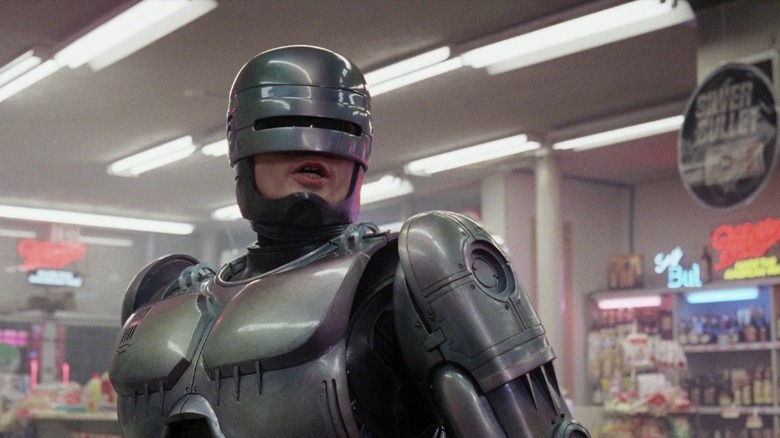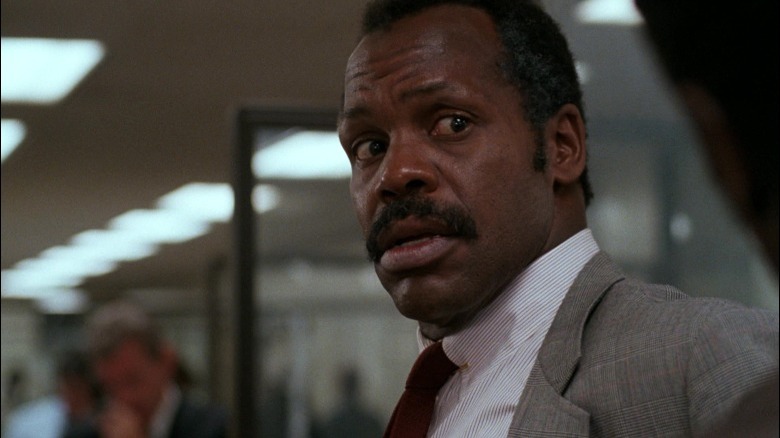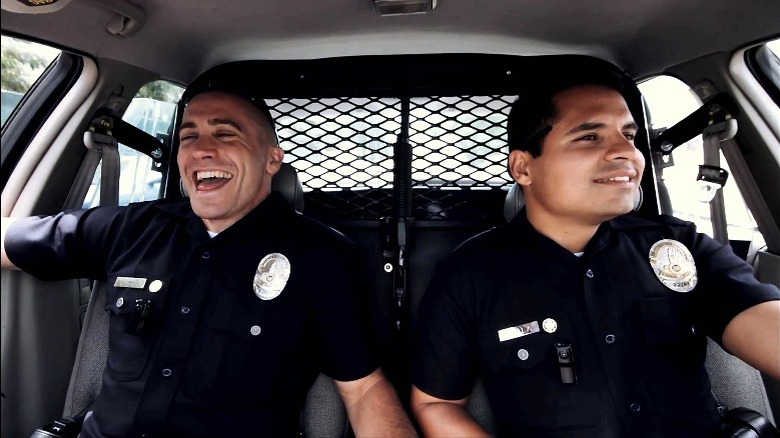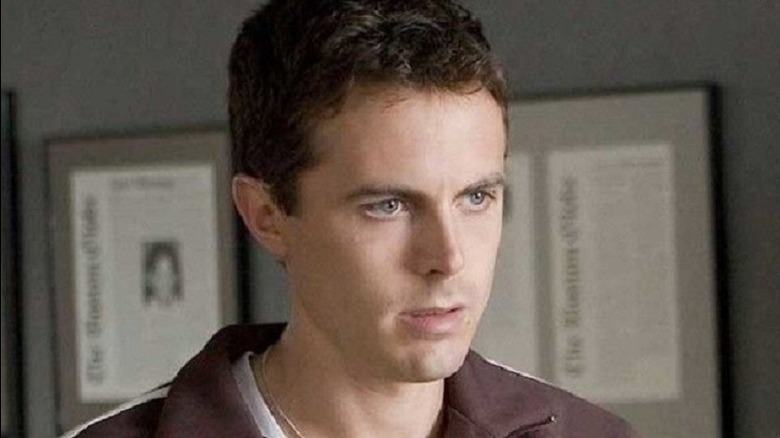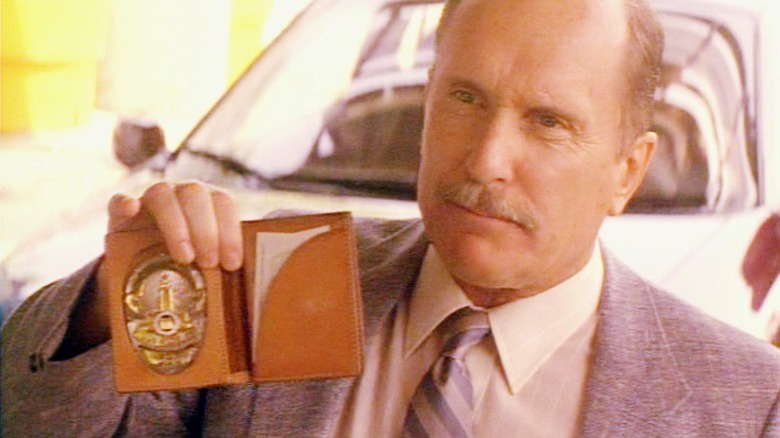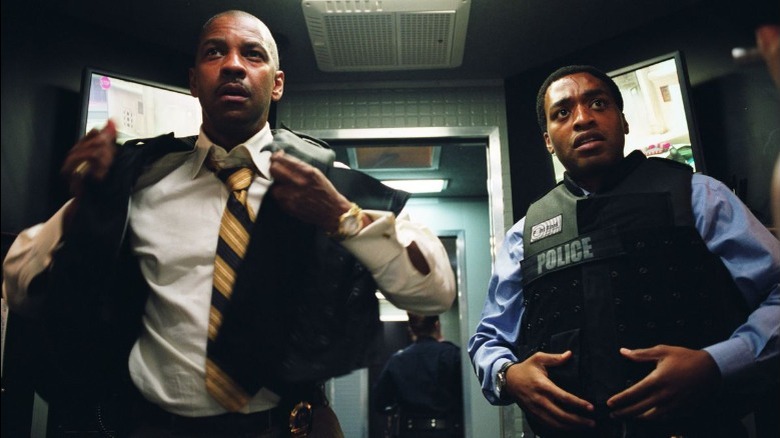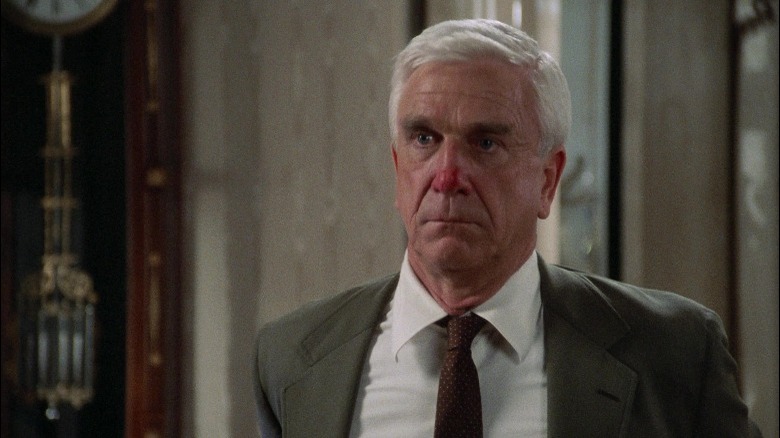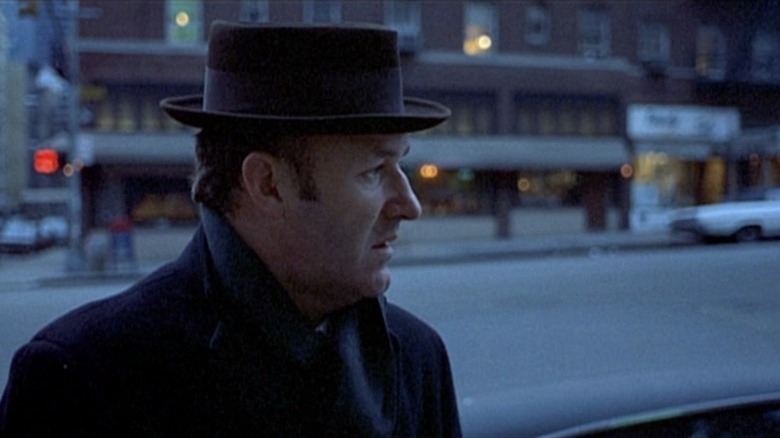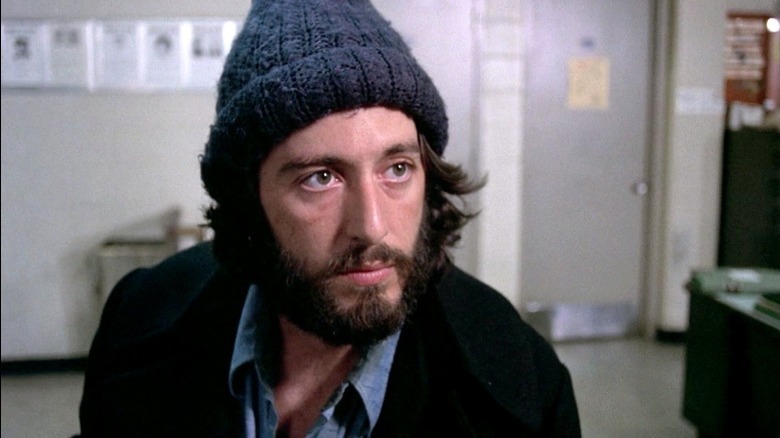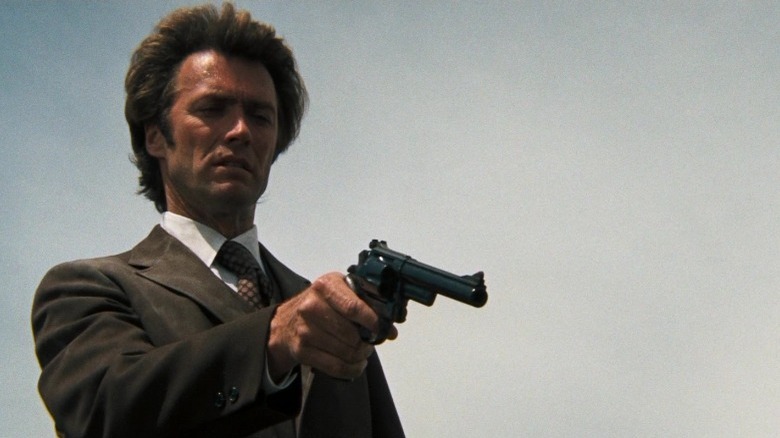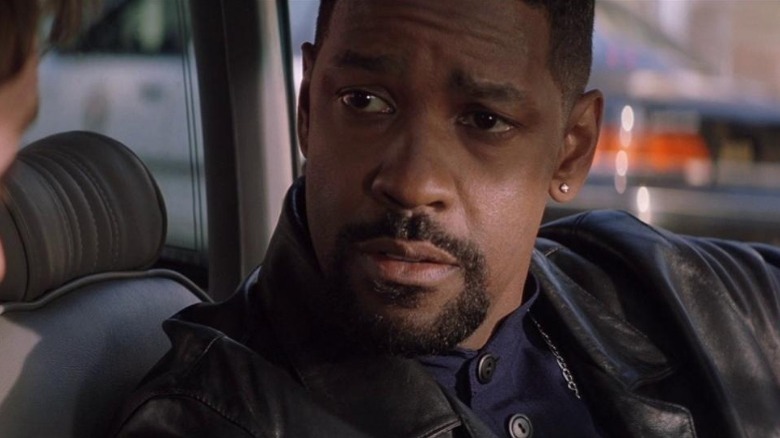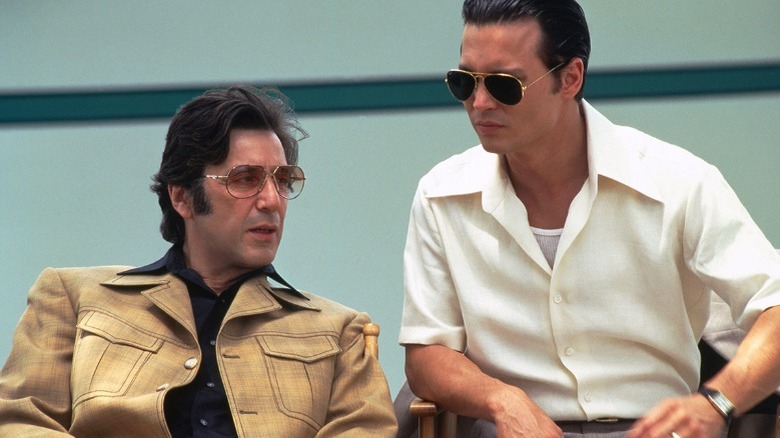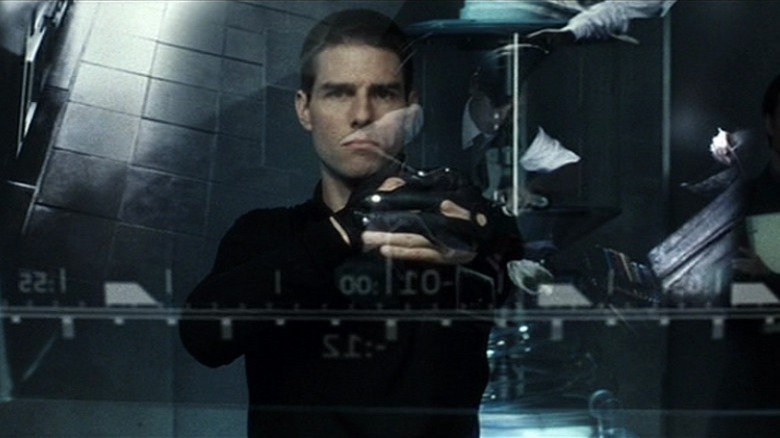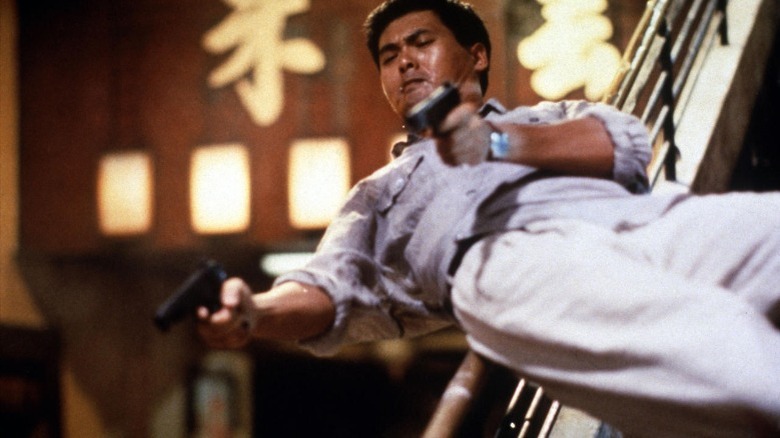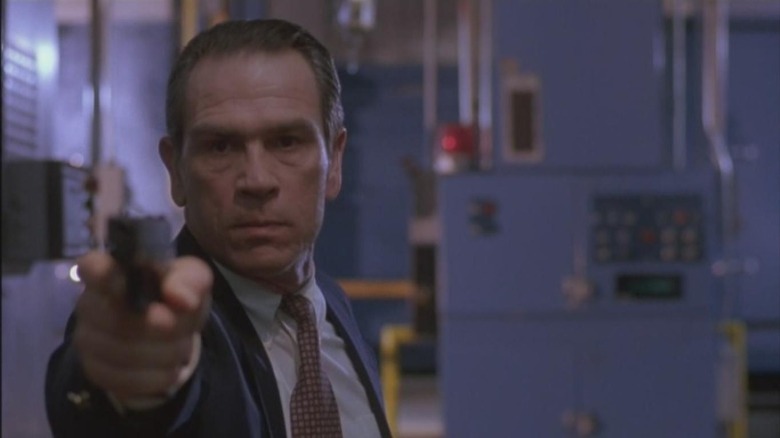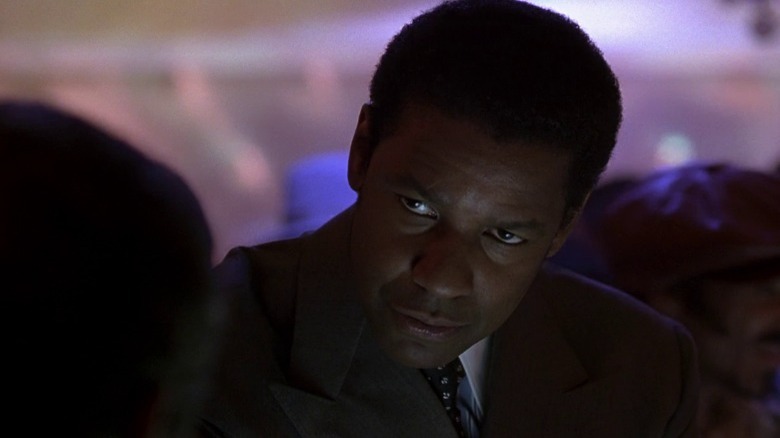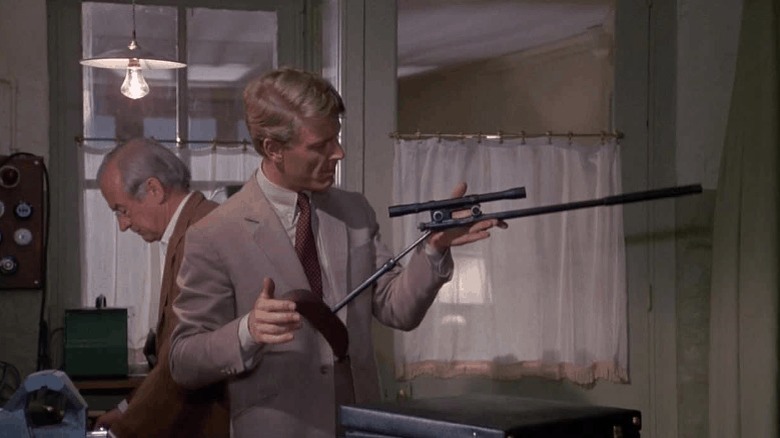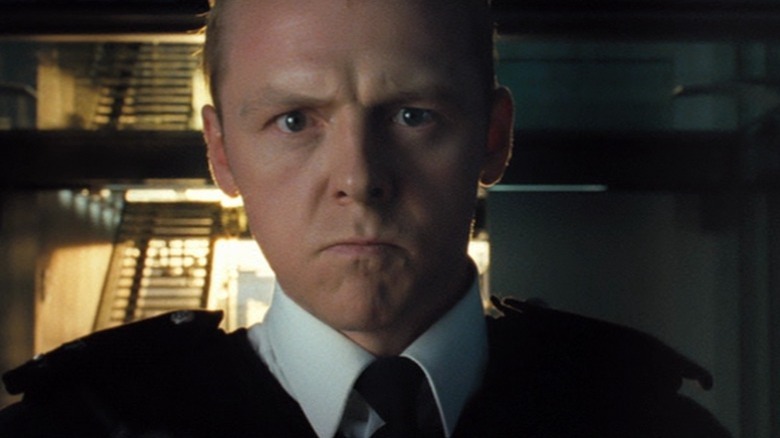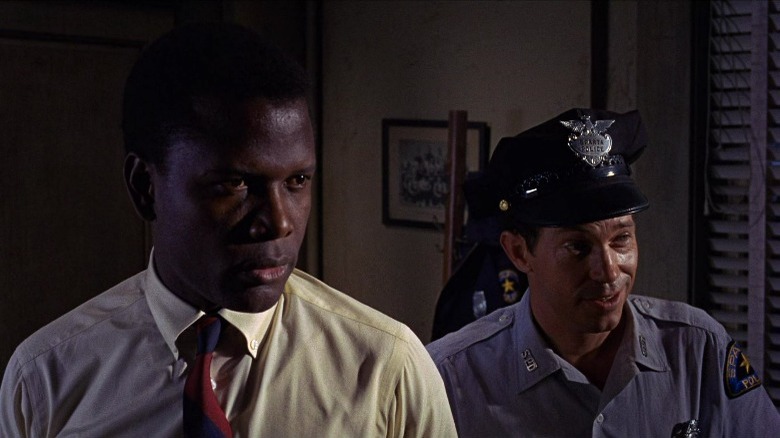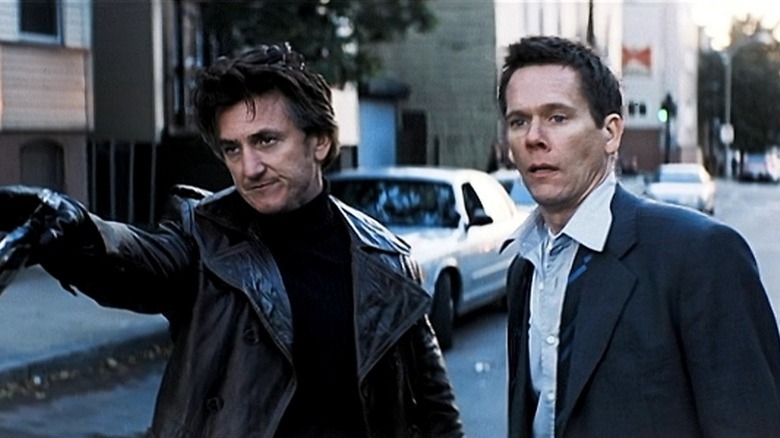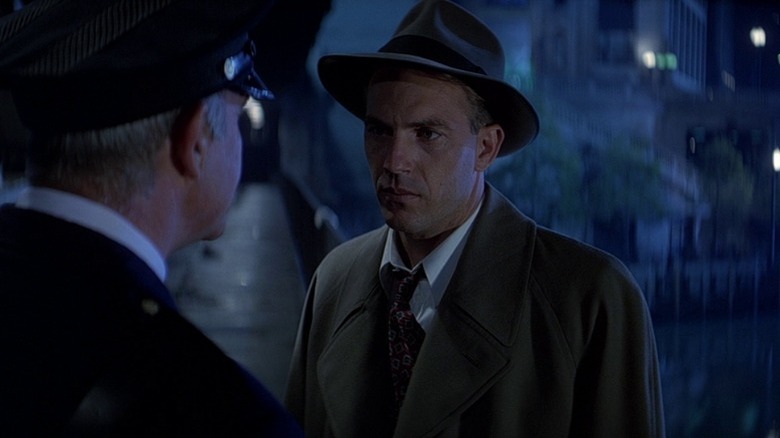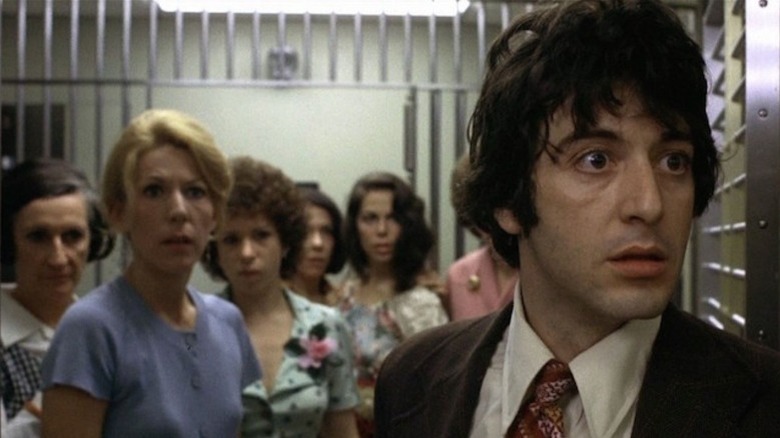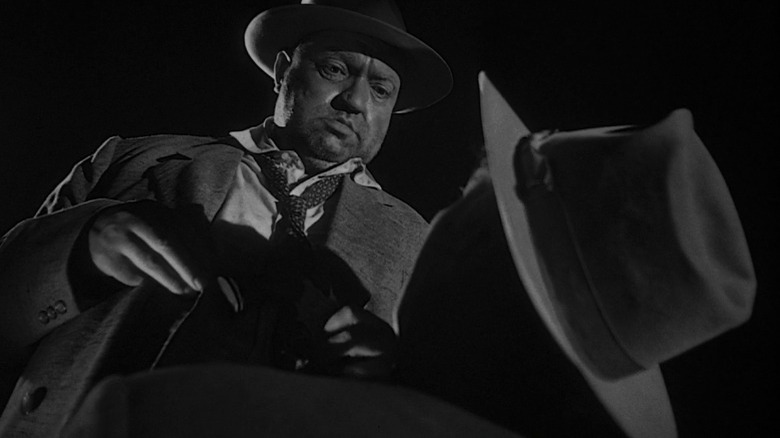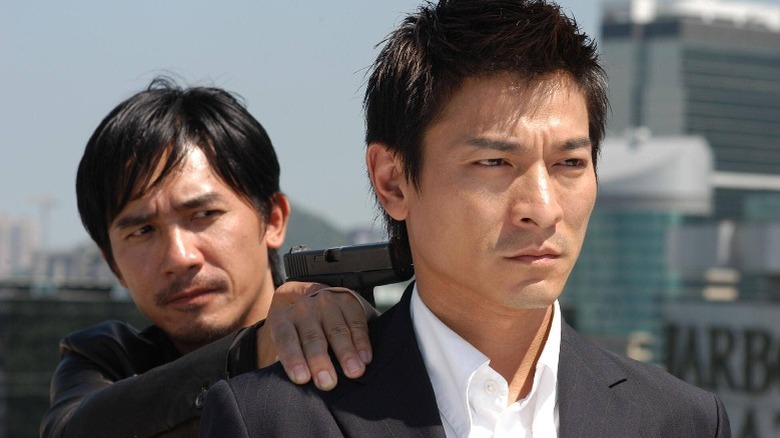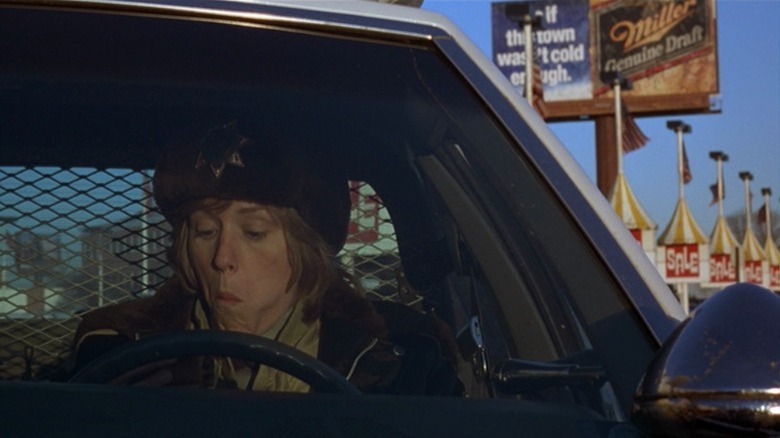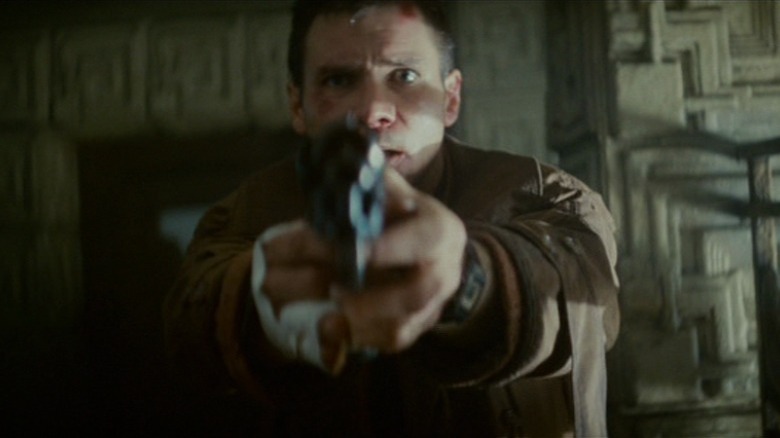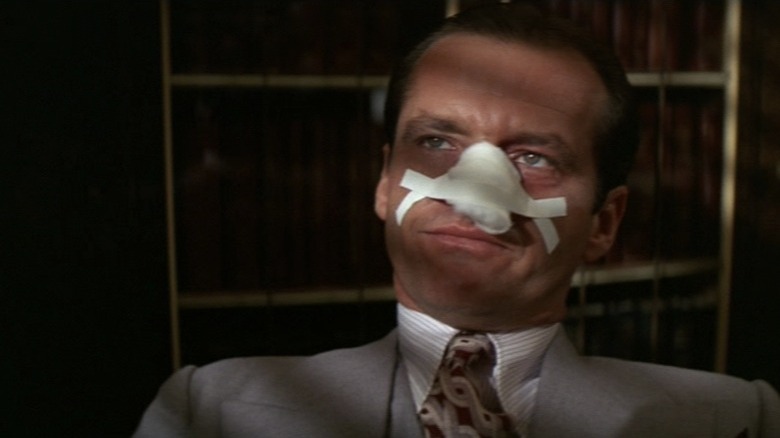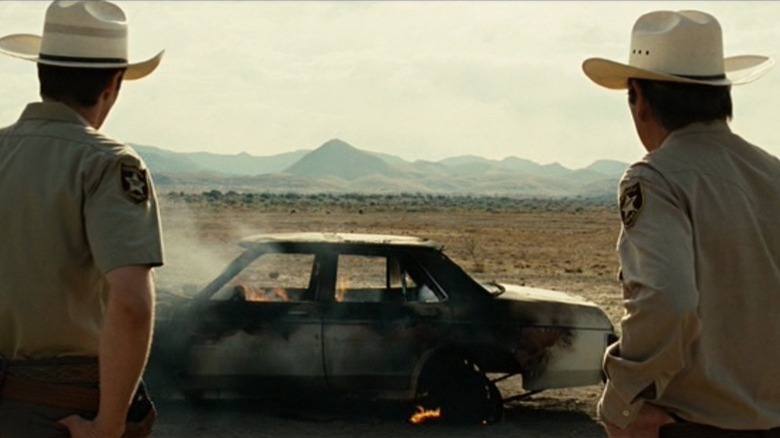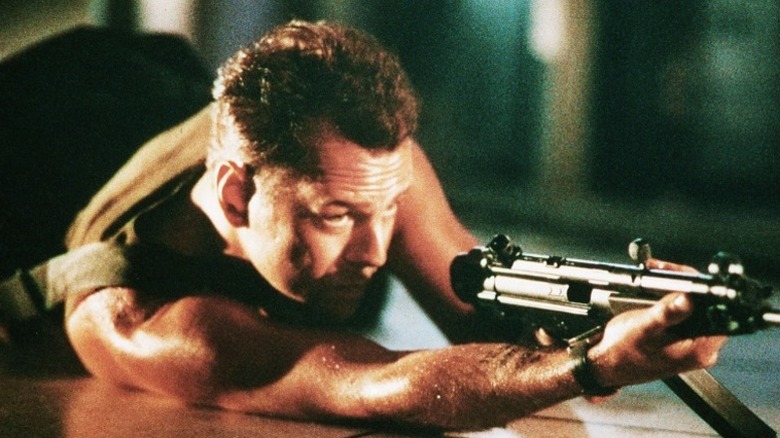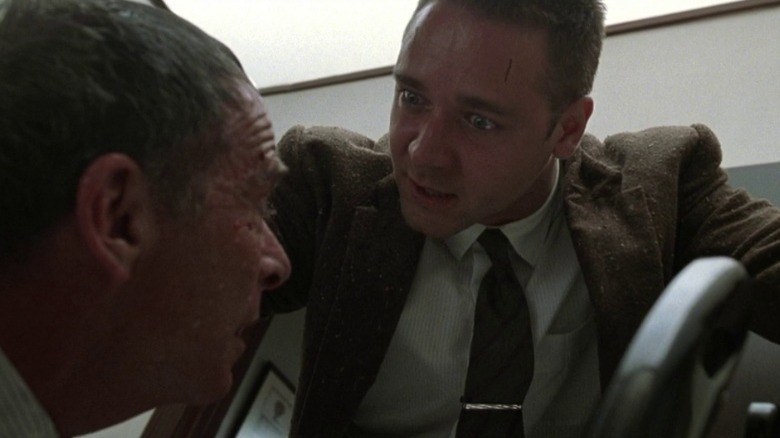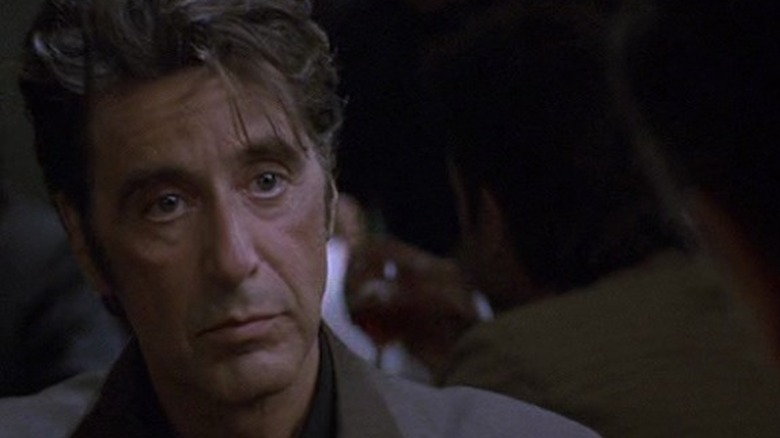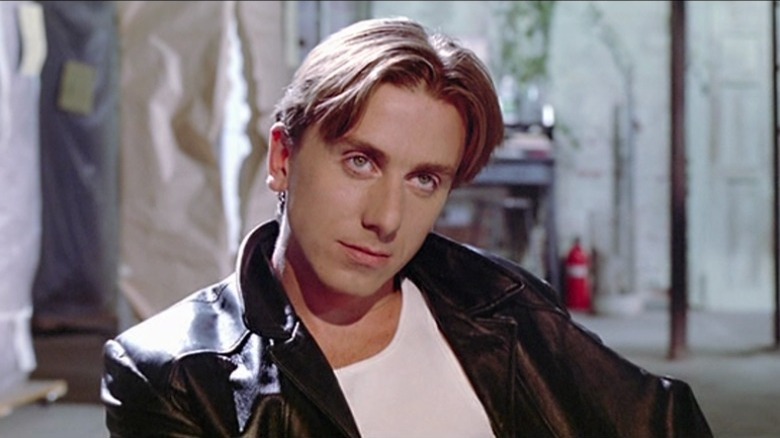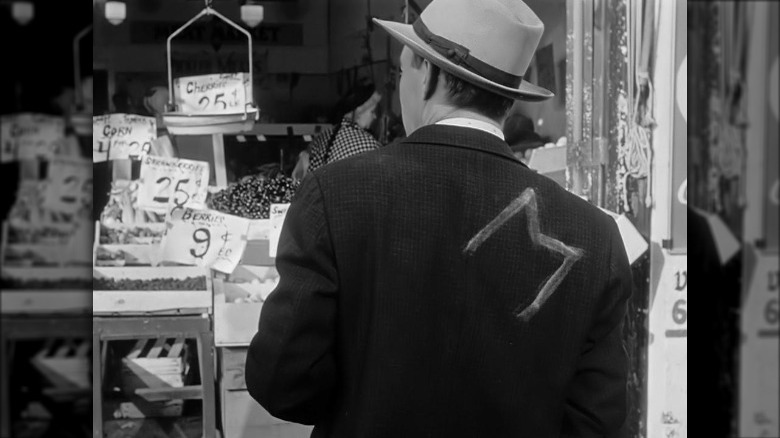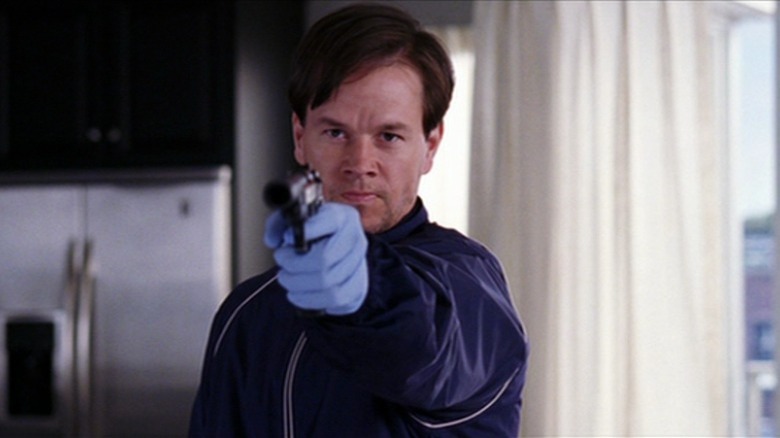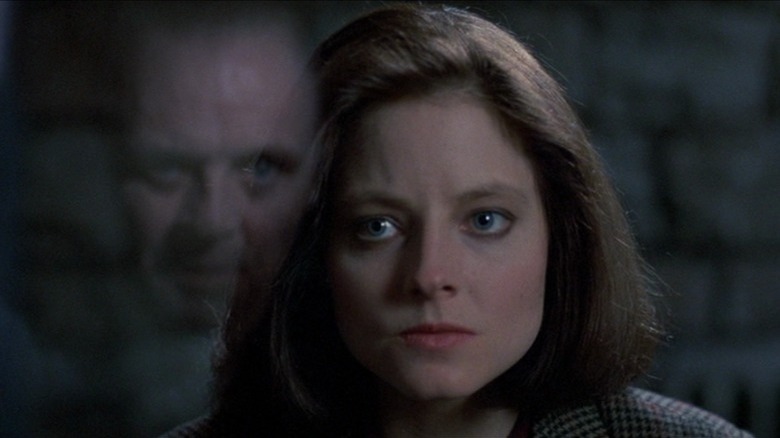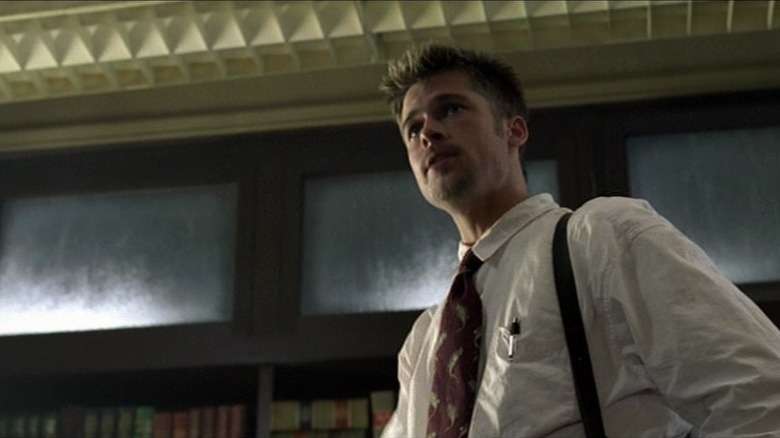50 Best Cop Movies Of All Time Ranked
Cop movies have long been a popular film genre and have been around longer than most people realize. Back in the Silent Era, movies and serials like "The Keystone Cops" kept audiences laughing in theaters all over the world. Some of those movies go back as far as the early 20th century and are hardly the only examples. In one form or another, cop movies have been around for well over a century.
In all that time, there have been hundreds, if not thousands, of movies dealing with the police across a plethora of subgenres. There are cop movies that fall under comedy, action, adventure, mystery, thriller, and much more. Whether a film is a run-of-the-mill buddy cop meant for laughs like "Beverly Hills Cop" or a serious examination of a horrific crime like "Manhunter," there's a cop movie for everyone.
Not every cop movie can stand as a perfect example of the genre. With so many out there, you can rest assured there are more than a few stinkers. Still, dozens of fantastic cop movies have been made over the years, many of which have been incredibly successful. The cop movies listed here are all considered to be some of the best of the genre.
50. Blue Streak
"Blue Streak" is arguably one of Martin Lawrence's funnies comedies, and it puts the comic in an unusual situation. In the film, Lawrence plays Miles, a renowned jewel thief who wants nothing more than to find a diamond he stashed in a building under construction before being arrested. Unfortunately, he gets out to discover that the building is now a new police station, which leaves Miles with the impossible task of breaking in, finding the diamond, and getting out undetected.
Since he has no way of doing this, he takes the road not traveled and pretends to be a detective. While working as a cop, he tries everything to get his hands on the diamond. At the same time, he works as a cop alongside legitimate police officers as he investigates burglaries with a keen eye for details only a seasoned criminal would catch. Of course, everything falls apart in spectacular fashion.
Lawrence is uniquely hilarious in the movie, which performed well at the box office, making nearly twice its budget. Regardless, critics were unkind to "Blue Streak," while audiences typically love it. It's a new spin on the buddy cop genre, as it's rare to see a criminal play the protagonist working alongside the good guys.
49. The Hard Way
"The Hard Way" is a true buddy cop film, as it stars James Woods as Lieutenant John Moss, a no-nonsense detective. He's paired with Michael J. Fox's Nick Lang, a pampered movie star who appears in action-adventure films similar to Indiana Jones. He's working on a new role after landing the lead in "Blood on the Asphalt." The police drama is more realistic than his usual fare, so he opts to train for it by shadowing a real NYPD detective — you see where this is going.
Of course, Lt. Moss is not interested in working with a Hollywood heartthrob, as he has more important work to do. Namely, he's tracking down a serial killer/vigilante known as the "Party Crasher." When he objects, he's threatened with being taken off the case unless he gives in and partners with a man who knows nothing of police work. The film climaxes with an inevitable confrontation that puts everyone's lives on the line.
"The Hard Way" wasn't a huge hit when it was released, but that may have had something to do with the stiff competition at the time. It came out at the same time as "New Jack City" and "The Silence of the Lambs."
48. Mad Max
Watching movies like "Mad Max: Fury Road" in the 21st century, it's easy to forget that it all started as a cop movie. "Mad Max" is set on the cusp of a complete breakdown of the Australian government due to an oil shortage. One of the few remaining law enforcement agencies, Main Force Patrol, fights a losing battle against berserk motorcycle gangs. The MFP's leading pursuer is Max Rockatansky, and he's outfitted with a brand new, specially built supercharged V8 Pursuit Special as his new police car.
He uses this vehicle to take the fight to the motorbike gang as its members become more brazen with their attacks. Members of the gang often attack and even murder innocent people wherever they find them, and Max is the only one able to stop them, but it won't be easy. As the action ramps up, Max's family pays the price, driving the officer to near madness as he uses his Pursuit Special without permission to bring the gang down once and for all.
"Mad Max" was a massive success when it was released. The film cost $380,000 to make, and its worldwide box office earnings topped $100 million, earning a record for the most profitable film.
47. The Blue Lamp
If you've ever been to the U.K., you may have noticed blue lamps hanging outside police stations. Those lamps provided the name for 1950's "The Blue Lamp," a police procedural film centered around two London policemen who find themselves dealing with a murder. PC George Dixon is a veteran constable on the verge of retirement, and just as he's about to head out the door to enjoy his pension, he's saddled with a recruit named Andy Mitchell.
Dixon's task is to prepare the new guy for the night beat, but when they answer a call about a robbery, he finds himself face to face with a man holding a gun. Dixon is shot and dies a short while later, but the movie doesn't end there. The killer is found with the help of criminals and other nefarious individuals, ultimately making Mitchell's introduction to the beat one he'll never forget.
"The Blue Lamp" is a classic example of social realism in its infancy. It integrates elements of film noir to examine the nature of a detective story, focusing on the nuances of the job. Despite dying in the film, George Dixon was the protagonist of the 1970s series "Dixon of Dock Green."
46. Bad Boys
"Bad Boys" gave the world the first pairing of Will Smith and Martin Lawrence in a buddy cop action film that stands as Michael Bay's directorial debut. While the film does follow the buddy cop concept, it strays from the pairing of a legitimate police officer with a newcomer or someone who has no business being on the job. Smith and Lawrence play seasoned Miami narcotics officers who are lifelong friends, so putting them together is far more natural than other buddy cop flicks.
In "Bad Boys," the two officers investigate the theft of $100 million in seized drug money, believing it to be an inside job. The entire department is on the line, and the clock is ticking for them to solve the case and bring in the bad guy (as well as a massive amount of cash). Lawrence and Smith are perfectly paired in this funny yet serious action drama, which was incredibly successful.
"Bad Boys" cost under $20 million to produce and netted more than $65 million at the box office. It has since spawned multiple sequels.
45. Bad Lieutenant
Cops are often presented as noble people who want to make the world a better place. That's not the case in "Bad Lieutenant," which features Harvey Keitel as an unnamed NYPD police officer. The movie opens with him snorting cocaine before heading to the scene of a double homicide, where he picks up a bag of narcotics and enjoys them. It's clear from the beginning that Keitel's character is indeed a bad lieutenant.
Without going into too much detail, the film follows the titular officer as he engages in drug abuse, extortion, and requested absolution. There's a lot of Catholic imagery strewn about, and ultimately, what you're left with is an honest and real portrayal of a truly dirty cop. It's an unusual take on a classic trope, and Keitel plays it to perfection. He took home the best male lead award from the 1993 Film Independent Spirit Awards for his incredible performance.
If you or anyone you know is struggling with addiction issues, help is available. Visit the Substance Abuse and Mental Health Services Administration website or contact SAMHSA's National Helpline at 1-800-662-HELP (4357).
44. Rush Hour
Buddy cop films often take a fish out of water approach when pairing someone with a professional detective, but "Rush Hour" flips this. Instead, it takes a reckless police detective played by Chris Tucker — a man who never wants to work with a partner and pairs him with Jackie Chan. Instead of the outside being the odd man out, Chan plays the straight man and consummate professional from the Hong Kong police department.
The pairing of these two hilarious actors is exceptionally well done in the film, which focuses on a kidnapping and theft that requires the expertise of members of the FBI, LAPD, and HKPD. Chan and Tucker play off one another with expert timing throughout their scenes. The movie proved to be a massive success, making over $240 million on a budget of around $33 million.
The success of "Rush Hour" all but guaranteed a sequel, which came three years later. Another sequel followed that six years later. While all three films in the "Rush Hour" franchise are fun and entertaining, the sequels failed to match the original's success. Despite this, "Rush Hour 4" has been in development for some time.
43. Cop Land
"Cop Land" is a neo-noir film centered on Sylvester Stallone's Sheriff Freddy Heflin. He's the sheriff of a small New Jersey town that has some issues with the corrupt NYPD officers living there. Stallone is joined by a plethora of talent, including Harvey Keitel, Robert De Niro, Robert Patrick, Ray Liotta, Michael Rapaport, and many others. The film begins with Sheriff Heflin's defense of the officers he idolizes, but this changes over time.
When two officers shoot and kill a couple of Black teenagers, the coverup and ensuing fallout from their crime change things. He opts to aid Internal Affairs in its investigation but hits a brick wall, forcing him to take matters into his own hands. With so much corruption and crime going on under his nose, Sheriff Heflin finds himself taking charge in a war with a cadre of bad cops he once idolized.
Stallone gives an excellent performance opposite several veteran police movie actors, and he manages to hold his own throughout the film, which did reasonably well at the box office. The movie is consistently praised by critics and audiences, ensuring "Cop Land" remains one of Stallone's best serious roles.
42. Manhunter
While most people likely believe "The Silence of the Lambs" was the first film adapted from the "Hannibal Lecter" novels, that isn't true. "Manhunter" holds that distinction, as it is an adaptation of Thomas Harris' "Red Dragon." The film focuses on FBI criminal profiler Will Graham as he comes out of retirement to bring his particular set of skills to the investigation of a serial killer known as the Tooth Fairy.
Graham has a history with an incarcerated serial killer/cannibal, Dr. Hannibal Lecktor. He must put this aside to work with the man that nearly killed him to ask for his help in finding the Tooth Fairy before he can kill again. The film takes a deep dive into the nuances of the FBI's forensic work and follows the novel fairly well. The movie wasn't well received when it was first released, only managing to make a little more than half its budget at the box office (per Flickering Myth).
Despite this, modern audiences have given the film a second life. It has since become a cult classic, and overly critical reviews in 1986 have been replaced with a more appreciative take on the film's stylistic visuals.
41. Speed
Keanu Reeves tends to make a splash in every movie he leads; that was as true in 1994 as it is today. Long before he played John Wick, Reeves took on the role of LAPD SWAT officer Jack Traven in "Speed." He and his partner Harry Temple work tirelessly to stop a serial bomber actively targeting the city. The bomber chooses a city bus as his target, engineering a bomb that will detonate if the bus' speed falls below 50 MPH.
Officer Traven manages to get onto the bus, where he meets Sandra Bullock's Annie Porter, a woman who has to take over driving the bus after the driver is shot. From this point forward, everything happens quickly, making the title rather fitting. There's plenty of action and close calls as Traven and Porter do everything they can to thwart the bomber, save the busload of passengers, and find the bad guy.
"Speed" was an incredible success upon release, earning $121 million on a budget around a quarter that size. The film's success resulted in a sequel, "Speed 2: Cruise Control," which you won't find on this list of the best cop movies of all time.
40. Beverly Hills Cop
Eddie Murphy took his expert comedic timing off the stage at "Saturday Night Live" and launched an incredibly successful film career with 1982's "48 Hrs." While that film is a cop movie, it's not as good as the film he did a couple of years later that introduced the world to Detective Axel Foley. "Beverly Hills Cop" features Murphy as Foley, who finds himself leaving his Detroit beat for Beverly Hills, California, where he works to solve the murder of his best friend.
If there's one thing the local precinct doesn't like, it's an out-of-town cop stirring up trouble in its jurisdiction, so it doesn't take long for Foley to make trouble. He winds up getting a couple of detectives on his tail, which he handles in hilarious ways — even a banana is involved. "Beverly Hills Cop" wasn't Murphy's first successful film, but it was the one that proved to the world that the funny comic from "SNL" was an international superstar who didn't need to stray far from his comedic roots, especially where Axel Foley was concerned, to succeed on the silver screen.
39. Bullitt
In "Bullitt," San Francisco Police Department detective Lieutenant Frank Bullitt and his team take on the job of guarding a would-be witness against the mob. The team splits up guard shifts to ensure the witness' safety, but two hitmen storm the hotel room at 1:00 am, seriously injuring the witness. Bullitt thwarts another assassination attempt, but the witness succumbs to his injuries.
Before long, the detective learns that the witness stole millions from the mob, and his investigation draws the attention of some hitmen. What follows is one of cinema's greatest car chase scenes, with Bullitt driving his Ford Mustang 390 GT as he outmaneuvers the assassins in their Dodge Charger R/T 400. The film then follows Bullitt as he investigates the truth of the assassination and finds out who's involved.
"Bullitt" is a cop classic and one of Steve McQueen's most significant cinematic roles. The film was a major success and was nominated for numerous awards. It took home an Academy Award and made the 1968 Mustang GT one of the most popular cars in America — the original used in the movie sold for $3.74 million in 2020.
38. Witness
When an Amish woman's young son witnesses the murder of an undercover policeman at a Philadelphia, Pennsylvania, train station, they become targets in need of protection. "Witness" sees the two return home, where detective John Block, played by Harrison Ford, must fit in to ensure they remain protected in a community ill-equipped to defend itself from the threat the outsiders pose.
Detective Block soon becomes a fish out of water in the Amish community, where he must hide to protect himself from corrupt police officers involved in the murder and a drug ring. Block takes shelter with the Amish and blends into the community while continuing to protect his witness. Ultimately, a fight in town draws the attention of the corrupt cops, leading to an all-out conflict that threatens everyone Block has come to care for.
"Witness" offers a glimpse into an oft-misunderstood community, making it a relatively unique cop movie. The film has been exceptionally beloved by critics and audiences and was nominated for eight Academy Awards, winning two, including best original screenplay and best film editing at the 58th Academy Awards.
37. Traffic
Steven Soderbergh's "Traffic" is all about the illegal drug trade, but it covers everything instead of focusing on one aspect. The film features the points of view of users, drug enforcers, politicians, and the people who traffic drugs. Each segment is edited into a solid narrative, though there aren't interactions between all the characters, and there are tons of them. The film stars a massive ensemble cast, including Don Cheadle, Michael Douglas, Benicio del Toro, James Brolin, Catherine Zeta-Jones, and many others.
Because the movie focuses on the entirety of the drug trade, it features a great deal of law enforcement but also the politics of drug criminalization. It also examines the impact of these laws on the people who use and abuse illicit substances. The film was remarkably successful, earning more than four times its budget at the box office and a bevy of impressive awards from numerous agencies.
"Traffic" took home four Academy Awards, including best director, best supporting actor, best adapted screenplay, and best film editing. The film spawned a three-part miniseries of the same name on USA Network in 2004.
36. RoboCop
While most films on this list are grounded in realism, there's plenty of room in the cop genre for science fiction. There are numerous potential sci-fi entries for this kind of article, including "Dredd." Still, the quintessential police sci-fi film is, and likely always will be, "RoboCop." The film is set in Detroit, Michigan, where crime has gone off the scale, forcing the police department to fall under a private corporation called Omni Consumer Products.
When Alex Murphy transfers to the Metro West department, his first day begins with a car chase and ends with his brutal murder at the hands of Clarence Boddicker and his gang. Murphy didn't die — well, not entirely, leaving OCP enough wiggle room to transform him into a cyborg police officer capable of taking on the criminal underground of Detroit, and that's precisely what he does in this ultra-violent satire of law enforcement and commercialization in America.
"RoboCop" was financially successful, even if its embrace of graphic violence turned some viewers away, ultimately launching a franchise that has seen a bounty of films, shows, comics, and video games.
35. Lethal Weapon
Buddy cop movies often pair a reckless, renegade younger cop with a wizened older officer looking forward to their retirement, and "Lethal Weapon" is the best example of the trope. The film sees Mel Gibson's Sergeant Martin Riggs team up with Danny Glover's Sergeant Roger Murtaugh, and the two are an odd pairing, to say the least. Murtaugh is a family man set on retiring one day, while Riggs is depressed, making for a dangerous combination.
Ultimately, the two find a way to work together as they stumble upon a rogue element of former CIA agents involved in all manner of crimes. They set their sights on the two LAPD Sergeants, and a couple of dastardly near-death experiences help bring the two officers closer together than they ever thought possible. Much of what makes "Lethal Weapon" work so well is the chemistry the two leads have on-screen, which helped create a franchise.
The success of "Lethal Weapon" led to three sequels and a live-action television series, and a fifth "Lethal Weapon" film has been in various stages of development for several years.
34. End of Watch
One thing that most cop movies feature is an overarching plot centered around a specific criminal element or a crime that's being investigated. Rarely will a film focus on the police officers themselves and the lives they lead as they walk their beat. "End of Watch" is one such film, as it stars Jake Gyllenhaal and Michael Peña as Los Angeles Police Department officers Brian Taylor and Mike Zavala, two partners who work in South Los Angeles, California.
The film is less about an overarching plotline than it is about the day-to-day lives of the two officers. Taylor records their activities as part of a class he's taking, which gives the movie a sort of found-footage/episode of "COPS" vibe as they interact with gang members in their area, respond to calls, and carry on with their professional and personal lives and relationships. The unusual cinematography creates a more realistic feel than is typical of similar cop movies.
One thing "End of Watch" does well is avoiding the trope of the buddy cop film by steering clear of clichés. This sets it apart from its peers, ensuring it stands out as a far more realistic representation of police officers' daily lives.
33. Gone Baby Gone
Ben Affleck's directorial debut, "Gone Baby Gone," is one of the Oscar winner's best and most successful films. The movie is based on Dennis Lehane's novel of the same name and stars Casey Affleck and Michelle Monaghan. The two are private investigators tasked with finding a girl who was abducted from her mother's apartment. They take on the case after seeing an impassioned plea from the girl's mother on television. It doesn't take long to discover a drug connection and a lot of stolen money.
The investigators work with detectives who are on the case, but as things ramp up, the situation takes a turn for the worse. Months later, another child's abduction catches the attention of the investigators, who become involved as they attempt to find the child. Of course, things aren't as they appear, and before long, hints of a conspiracy reveal a sinister plot, ramping up the suspense and mystery in this impressive film from a new director.
"Gone Baby Gone" earned praise for Affleck's directing skills as well as numerous award nominations, including one for best supporting actress at the Academy Awards.
32. Falling Down
At first glance, "Falling Down" comes off as a movie about a man who's had enough of everything going wrong in his life, and he decides to do something about it. Michael Douglas plays William Foster, a man nearly everyone can identify with, as everything in his life falls apart, forcing him to act in increasingly violent ways.
All he wants to do is make his way across LA to make it in time for his daughter's birthday, but things continue to get in his way. Instead of accepting his hurdles, he instead knocks them all down. This attracts the attention of LAPD Sergeant Martin Prendergast, played by the inimitable Robert Duvall. It's Prendergast's last day before retirement, but he becomes intrigued with the clues Foster leaves behind.
As he finally uncovers who Foster is and what he's been doing (and wants to do), the two find themselves facing off against one another on a pier, and it's clear that Foster isn't a man who's had enough; he's a truly bad guy few people in the audience could honestly identify with. The moral complexity of "Falling Down" makes it a compelling analysis of the rule of law.
31. Inside Man
Sometimes the best cop movies don't focus on the police as much as they do on the crime they're investigating. For "Inside Man," that's certainly the case, as the film focuses on a Wall Street bank heist throughout a 24-hour period. Denzel Washington plays New York Police Department hostage negotiator Detective Keith Frazier opposite Clive Owen's Dalton Russell, the man behind the plan. The film also stars Christopher Plummer and Jodie Foster, so there's a lot of talent in this Spike Lee thriller.
"Inside Man" is Washington's fourth collaboration with Lee, who offered him both roles of Frazier and Russell. The veteran actor's masterful ability to perform his character's complex dialogue sets the film apart, as any Lee movie is, from its peers. Of course, the title alone should give away some of the film's mystery, but any hint of an inside man in the heist isn't suggestive of what actually transpires in the movie.
The film did well at the international box office, pulling in more than $186 million on a $45 million budget. It scored well with critics as well, earning the coveted "Fresh" rating from Rotten Tomatoes and comparable praise from other review aggregating sites.
30. The Naked Gun: From the Files of Police Squad!
People often think of cop movies as something dealing with serious issues. After all, crime is no laughing matter, but that doesn't mean a bumbling police investigator isn't. "The Naked Gun: From the Files of Police Squad!" is a slapstick comedy based on the 1982 television series "Police Squad!" and stands as a continuation of the show. The film stars Leslie Nielsen as Lieutenant Frank Drebin and includes a fantastic cast of characters.
After his partner is nearly killed, Lt. Drebben launches an investigation to find the bad guy. He crosses paths with Ricardo Montalbán's ruthless real estate tycoon, who introduces him to Jane Spencer, played by Priscilla Presley. Every moment of this film is spent cramming in absurd humor, which Nielsen plays perfectly as the would-be straight man in an uproarious comedy that redefined slapstick for a new generation.
"The Naked Gun" was critically acclaimed upon release, and it was a massive financial success at the international box office. Its success led to two sequels, both of which saw the cast return in 1991's "The Naked Gun 2+1⁄2: The Smell of Fear" and "Naked Gun 33+1⁄3: The Final Insult" in 1994.
29. The French Connection
"The French Connection" tells the tale of Jimmy "Popeye" Doyle, a New York Police Department detective who works with his partner, Buddy "Cloudy" Russo, on a narcotics case with international connections. The film pairs Gene Hackman as Popeye with Roy Scheider's Cloudy in what is arguably one of the best movies ever made. The film begins in Marseille, where Alain Charnier is established as the leader of the world's largest heroin smuggler. He plans to move $32 million worth of his product into New York City, which brings Popeye and Cloudy into the mix.
The detectives connect the heroin sold on the streets of New York with Charnier's syndicate. They're soon paired with a couple of feds as the investigation ramps up. What follows is an amazing chase, some near-death experiences, and one of the greatest police movies ever made. "The French Connection" is based on real-world events from the 1960s and '70s, which helps to ground the film in a realistic portrayal of narcotics smuggling operations and the cops who bust them.
"The French Connection" made more than 18 times its budget and was hugely successful. It swept the 44th Academy Awards, taking home statues for best director, best picture, best actor, best editing, and best adapted screenplay.
28. Serpico
"Serpico" tells the real-life story of New York Police Department Detective Frank Serpico and is adapted from Peter Mass' book of the same name. The film focuses on Detective Serpico's fight within the NYPD against widespread corruption that had been running rampant throughout the nation's largest police department for many years. The film stars Al Pacino as the eponymous detective he worked with to help prepare for the role. Serpico isn't just a police detective; he's a whistleblower, and his story begins with a bullet to the face.
As he's rushed to the hospital, his story is told in the form of a flashback, beginning with his graduation from the police academy. His rise through the ranks of the NYPD while simultaneously encountering hurdles and frustrations resulted in his transfer to the 7th division, where corruption is running rampant. Before long, his life is put in danger by those who are supposed to be his comrades. His investigation ramps up, culminating in his shooting, promotion, and testimony at the Knapp Commission, helping to root out corruption in the NYPD.
"Serpico" consistently appears on lists of the greatest movies, including several from the American Film Institute. It's also a critically-acclaimed, award-winning masterpiece.
27. Dirty Harry
Stop someone on the street and ask them who is one of the greatest characters in the history of cop movies, and odds are, you're going to hear the name Dirty Harry more often than not. Clint Eastwood's iconic character from his eponymous 1971 film stands as one of the greats, and it's more to do with the character's characteristics than the story, though that's equally as impressive.
In the first of five movies that make up the "Dirty Harry" franchise, Eastwood establishes San Francisco Police Department Inspector "Dirty" Harry Callahan as a no-nonsense officer on the trail of a sadistic serial killer called "Serpico," who takes out random targets with a sniper rifle. The film takes a great deal of inspiration from the real-life case of the Zodiac Killer, but with a far more satisfying conclusion.
"Dirty Harry" was an instant classic, and it was highly acclaimed. The film was also a financial success, which helped it become the first of five in the "Dirty Harry" franchise. It's also the film that glorified the .44 Magnum and the phrase, "You've got to ask yourself one question: 'Do I feel lucky?' Well, do ya, punk?"
26. Training Day
"Training Day" is, without a doubt, a rollercoaster ride of a cop thriller. The film stars Denzel Washington as Detective Alonzo Harris. He's teamed up with Ethan Hawke's Detective Jake Hoyt on his first day working the narcotics beat in various parts of Los Angeles, California. The entire film takes place in 24 hours, and they make up what has to be the most trying training day for any officer in the Los Angeles Police Department.
It takes little time for Hoyt to see that the veteran narcotics officer he's meant to train with isn't exactly playing things by the book. He's forced to smoke marijuana laced with PCP, is brought into a sincerely corrupt scheme, becomes involved in a murder coverup, and more — all on his first day with Detective Alonzo. To say this movie is tense throughout isn't exactly doing it justice, as it will keep the viewer on the edge of their seat for the entire 122-minute runtime.
"Training Day" was a huge hit when it was released, and Washington's performance earned him his second Academy Award, this time for best actor at the 74th Academy Awards. Hawke was also nominated for best supporting actor, though he didn't win.
25. Donnie Brasco
"Donnie Brasco" features an all-star cast that includes Al Pacino, Johnny Depp, James Russo, Anne Heche, Michael Madson, and others. The film is based on the true story of Joseph D. Pistone and is an adaptation of his book, "Donnie Brasco: My Undercover Life in the Mafia." As the title implies, the story revolves around an undercover FBI agent established within the Bonanno crime family in New York City during the 1970s.
Depp plays Agent Pistone, who goes by the name Donnie Brasco, as he infiltrates the crime family pretending to be a jewel thief. He does this by getting close to Lefty Ruggiero (Pacino), who vouches for him, helping Brasco get deeper into the mafia. As he continues to work undercover, Brasco finds that he's having to cross more and more lines, blurring the one that divides his work as a federal agent and that of a thief working for the mob.
Throughout it all, Brasco's friendship with Lefty develops, endangering him should his cover be blown. "Donnie Brasco" was a hit when it was released, managing to rake in nearly twice its budget at the box office. It also nabbed an Academy Award nomination for best adapted screenplay.
24. Minority Report
"Minority Report" takes a different approach to law enforcement via its Precrime division. In the film, Tom Cruise plays Precrime chief John Anderton, a man who is very good at his job but not his private life. After losing his son, his marriage fell apart, and he put everything he had into his career, hunting down criminals before they commit any crimes. They do this with the help of three clairvoyant people known as "Precogs."
When Chief Anderton's name comes up as a murderer, he flees his office, knowing he will be captured and put on ice before he has the chance to kill. Without knowing who he's meant to kill or why Anderton launches a desperate investigation to avoid the crime and clear his name. It all comes to a head when the Precogs' visions come true, leading to an inevitable conclusion Anderton hopes to avoid.
The film's innovative take on crime makes it a fascinating examination of the notion of cause and effect by flipping it. Anderton's desperate attempt to keep from committing murder drives preconceived events toward the foreseen conclusion, forcing the viewer to wonder if he had a choice in the matter at all.
23. Hard Boiled
John Woo's final Hong Kong action film before transitioning to Hollywood is arguably one of the filmmaker's best. "Hard Boiled" stars Woo's longtime collaborator, Chow Yun-fat, as Inspector "Tequila" Yuen. The film opens with Tequila and his partner busting a gun smuggling ring, but when his partner is killed, Tequila executes the bad guys instead of arresting him, which gets him thrown off the case.
Tequila's character may seem somewhat familiar to viewers of "Dirty Harry" because the film is structured as an homage to the Clint Eastwood classic. Woo's signature over-the-top style and penchant for close-quarters gun fights work well with the über glorification of the police. Tequila is a disobedient, no-nonsense cop willing to cross any line to get the job done no matter the cost.
"Hard Boiled" is the antithesis to Woo's earlier film, "The Killer," which glorifies crime, and specifically, a remorseful hitman (also played by Chow). While "Hard Boiled" failed to attract audiences in the East, it did well with Western audiences, making it the perfect transition film for Woo to make his move to Hollywood.
22. The Fugitive
"The Fugitive" stars Harrison Ford as Dr. Richard Kimble, an escaped convict meant to spend the rest of his days behind bars for the murder of his wife. Kimble is innocent of the crime, but that hardly matters in this intense thriller that's all about the chase. While Kimble works tirelessly to prove his innocence and find the man who killed his wife, he's chased by a great deal of law enforcement officers led by Deputy U.S. Marshal Sam Gerard, played by Tommy Lee Jones.
Throughout the film, there are several close calls as Gerard employs all manner of techniques to find his man. He nearly captures him, even going so far as to tell him he doesn't care if Kimble is guilty or innocent. To his credit, Kimble is willing to leap to almost certain death, prolonging the chase and ensuring Gerard will step up his game and do whatever he can to bring Dr. Kimble back to justice.
"The Fugitive" was a massive success, managing to bring in nearly 10 times its budget at the worldwide box office. It also earned Jones an Academy Award for best supporting actor for his incredible performance.
21. American Gangster
"American Gangster" pairs Denzel Washington with Russell Crowe (for the first time in 12 years after they shared the screen in "Virtuosity"), as they play Frank Lucas and Richie Roberts, respectively. The film details a fictional account of real-life gangster Frank Lucas, who smuggled drugs on American service planes returning from the war in Vietnam. Lucas' drugs are branded "Blue Magic" on the streets in the United States, and it becomes popular thanks to the drug's purity and relatively low cost.
Blue Magic becomes a problem throughout the East Coast as Newark Detective Richie Roberts' partner overdoses on the drug. He launches an investigation into Lucas' criminal organization, even managing to get an informant on the inside. When Roberts and Lucas finally come face to face, a deal is made to uncover the vast criminal conspiracy and corruption spread throughout the New York DEA office, ensuring Lucas' impact goes further than Roberts could have hoped.
"American Gangster" did incredibly well at the international box office, managing to make over $267 million on a $100 million budget. The movie also garnered nearly two-dozen significant award nominations, winning several, including the Screen Actors Guild Award for Ruby Dee, who plays Frank's mother, Mahalee Lucas.
If you or anyone you know is struggling with addiction issues, help is available. Visit the Substance Abuse and Mental Health Services Administration website or contact SAMHSA's National Helpline at 1-800-662-HELP (4357).
20. The Day of the Jackal (1973)
"The Day of the Jackal" is based on Frederick Forsyth's novel of the same name from 1971. The film centers around the "Jackal," a master assassin known only by that name. Following Algeria's independence from the French government, a terrorist organization known as the OAS attempts to kill the president, but the plan fails miserably. Many OAS members are captured and executed, leaving a small group of remaining members to hire an assassin to carry out the job.
They contract the Jackal with a payment of $500,000 to kill French President Charles de Gaulle. The assassin commissions a unique rifle for the job, gets some fake papers to cover his tracks, and begins his plan to kill the president by renting a flat in Paris. When a high-ranking member of the OAS is captured, the plot comes to light, leading Inspector Claude Lebel to take the lead in the investigation of the Jackal, hoping to stop him before he strikes. "The Day of the Jackal" is critically acclaimed, though it didn't make a ton of cash at the box office.
19. Hot Fuzz
When Simon Pegg's Constable Nicholas Angel proves to be too good at his job as a Metropolitan Police officer, he's reassigned for making everyone in the department look bad in comparison. He's taken from the city to the suburbs, where he finds almost no crime to police in the rural town of Sandford, Gloucestershire.
The village and its people are all kind and delighted to help the new sergeant as much as possible, but there's more going on that arouses the suspicions of Angel, who begins an investigation. He's aided by Pegg's longtime collaborator Nick Frost, playing Constable Danny Butterman. He absolutely loves buddy cop films and is delighted to be living in one when Angel comes to town.
As time passes, Angel's investigation reveals a dark secret hidden in the village that suggests it isn't as peaceful as it appears. Not only is there a nefarious plot going on under his nose, but he soon learns that everyone is in on it, and it'll take all of his skills to uncover the truth. "Hot Fuzz" is a hilarious comedy, a fantastic buddy cop film, and a decent action movie, to boot.
18. In the Heat of the Night
"In the Heat of the Night" is based on John Ball's novel of the same name, which tells the story of Detective Virgil Tibbs. The detective undertakes an investigation into a murder in a small Mississippi town, which isn't keen on accommodating a hotshot detective from Philadelphia. Tibbs is brought onto the case when he's seen at the train station and arrested, not out of suspicion of committing the crime but entirely due to his affluence and skin color.
When it becomes clear that he's a top homicide detective from out of town, he's let go but remains to help crack the case. What follows is an in-depth analysis of a murder investigation in Mississippi by a Black man during the Civil Rights movement in the United States. The film is widely regarded as significant; "In the Heat of the Night" is the source of a quote many people are familiar with, where Sidney Poitier proclaims, "They call me Mister Tibbs!" The film won five of seven nominations at the 40th Academy Awards, including best picture and best actor for Rod Steiger.
17. Mystic River
"Mystic River" is a Clint Eastwood neo-noir crime film based on Dennis Lehane's book of the same name. The film is centered around the murder of Jimmy Marcus' (Sean Penn) daughter. Marcus' friends are involved, and the last person to see her alive is Dave Boyle, a run-of-the-mill blue-collar worker. Marcus, an ex-con, begins an investigation into the murder, believing that Dave is responsible, and he's more than willing to take the law into his own hands.
Meanwhile, a homicide detective, Sean Devine, heads up the case, which runs parallel to Marcus'. The two interact throughout the film as they both search for the killer, and the truth of Dave and his activities during the night of the murder come to light, proving him to be both a killer and innocent of the crime being investigated. The film did incredibly well, and in addition to directing, Eastwood scored the music, which was a first for him.
"Mystic River" has been critically acclaimed since its release, and it was also financially successful. It was nominated for six Oscars at the 76th Academy Awards, winning best supporting actor and best actor statues for Robbins and Penn, respectively.
16. The Untouchables
While "The Untouchables" is based on Eliot Ness' memoir of the same name, the film takes several licenses with the depictions of the real-life people and events covered in the book. This makes the movie more of an homage, though it does credit Ness, who is played by Kevin Costner. He's joined by an all-star cast that includes Andy Garcia, Sean Connery, and Robert De Niro, who plays Al Capone.
The film follows Ness, a prohibition agent who formed a group of law enforcement officers called "The Untouchables." The primary mission of Ness and his men is to bring Al Capone to justice, and the events depicted align somewhat well with the historical record. De Niro and Connery both knocked it out of the park in terms of their performances, and the film's score features period-accurate music merged beautifully with the events in the movie.
"The Untouchables" is one of the best films to depict prohibition and its impact on the development of underground criminal organizations that ultimately became the American Mafia. The film was nominated for four Academy Awards, with Connery winning the Oscar for best supporting actor.
15. Dog Day Afternoon
"Dog Day Afternoon" is based on P.F. Kluge and Thomas Moore's Life magazine article, "The Boys in the Bank." The film tells the story of the 1972 robbery and hostage situation at a bank in New York City. In the movie, Al Pacino plays Sonny Wortzik, one of the two robbers. John Cazale joins him as Sal Naturile, and they plan to rob a First Brooklyn Savings Bank, but they unknowingly choose the day after the bank's cash pickup, leaving only $1,100 in cash.
Before long, the bank is surrounded by police, forcing the robbers to take everyone inside hostage. Before long, Sonny walks outside with a human shield to establish a dialogue with the police. He invokes a recent prison riot by yelling "Attica! Attica!" to the crowd's enjoyment. Eventually, the FBI gets involved, and the crowd and several hostages begin to understand and show support for the robbers.
"Dog Day Afternoon" is one of Pacino's best early performances and stands as an excellent example of law enforcement from the perspective of desperate criminals. The film won the Academy Award for best original screenplay and was nominated for numerous other accolades.
14. Touch of Evil
It took some time, but one of Orson Welles' classics makes the list via "Touch of Evil." The film is loosely based on Whit Masterson's novel, "Badge of Evil," and stars Janet Leigh, Marlene Dietrich, Charlton Heston, and many other talented stars of the 1950s. The film involves an investigation into a bombing on the U.S.-Mexico border that kills Rudy Linnekar and his girlfriend, Zita.
Mexican Drug Enforcement Agent Miguel "Mike" Vargas (Heston) launches an investigation alongside his counterpart, U.S. police Captain Hank Quinlan (Welles). Before long, Mike begins to suspect Quinlan and his partner, eventually exposing a great deal of corruption that threatens his life and the life of his new bride, Susan "Susie" Vargas (Leigh).
When it was released in the States, "Touch of Evil" didn't get a lot of love, and the opposite proved true across the pond, where it took top honors at the 1958 Brussels World Film Festival. Since then, it has become a cult classic that Film Site regarded as one of the greatest examples of and the last true classic neo-noir films. A subsequent edit from Welles' original vision helped solidify the film's place in history.
13. Infernal Affairs (2002)
"Infernal Affairs" is an action-packed thriller that revolves around a great deal of duplicity. Lau Kin-Ming is a young member of the Triad who attends the Hong Kong Police Force academy to establish himself as a spy. At the same time, Chan Wing-Yan flunks out of the same police academy. In reality, he's placed in an undercover assignment that establishes him as a low-level member of the Triad, so he can inform on the group and eventually bring it down from within.
After 10 years, both men excel at their deception, with Chan finding his work difficult while Lau excels. He's promoted to Senior Inspector, and before long, both men learn that there's a spy in their organizations and set out to uncover their identity. Meanwhile, Chan prefers to continue his operations and begins to work against Lau by erasing his status as an undercover agent, making his return to the police force much harder than he imagined.
The film has an alternate ending, thanks to Chinese laws, and ends differently in Malaysia and China. If the plot seems familiar to you, that's because "Infernal Affairs" became the basis for another celebrated film on this list.
12. Fargo
"Fargo" tells the story of Jerry Lundegaard (William H. Macy), an Oldsmobile dealer strapped for cash. To generate some money, he hires two less-than-professional criminals to kidnap his wife. He plans to use the kidnapping to extort money from his wealthy father-in-law, who owns the dealership where Lundegaard works. The two men successfully kidnap the woman, but everything that can go wrong does go wrong relatively quickly. This draws the attention of police Detective Marge Gunderson (Frances McDormand), who launches an investigation to uncover the truth.
As her investigation intensifies, Lundegaard's plan falls apart further and further, eventually resulting in numerous killings and plenty of mishaps. The Coen Brothers' "Fargo" is arguably one of the writer/director duo's greatest films. It's introduced as being "based on a true story," but that's misleading. In reality, "Fargo" is inspired by a murder, and according to Ethan Coen, the disclaimer was meant to place the film in the genre of a true story film.
The film was critically acclaimed and a massive success. The AFI named it one of the 100 Greatest American Films in History, and it took home two Oscars at the 69th Academy Awards.
11. Blade Runner
"Blade Runner" is based on the book "Do Androids of Electric Sheep?" The film is set in 2019 (37 years in the future at the time), where Rick Deckard plays a burnt-out blade runner brought back to help deal with a group of rogue replicants who are running free on Earth. Replicants are bioengineered humans who are almost indistinguishable from the real deal, and their presence on the planet is illegal and dangerous, so Deckard is brought in to find them.
What follows is an intensive police investigation carried out by Deckard against the group of Nexus-6 Replicants hiding in LA. Deckard's job is to permanently "retire" the Replicants so they know they're fighting for their lives. At the same time, the replicant's engineered short lifespan is nearing its end, so they work to find a means of forcing their creator to extend their lives, and things get messy.
"Blade Runner" was not a successful movie upon release, which was due to several issues. A director's cut has since been released, and the film is now considered one of the greatest science-fiction movies of all time. A sequel, "Blade Runner 2049," was released in 2017.
10. Chinatown
"Chinatown" is one of Roman Polanski's most celebrated films. The movie stars Jack Nicholson as J.J. "Jake" Gittes, a private investigator hired by Evelyn Mulwray to trail her husband, the chief engineer at the Los Angeles Department of Water and Power. She suspects infidelity and wants Jake to find evidence, but the investigation hits a snag when the real Evelyn Mulwray (Faye Dunaway) confronts Jake, threatening to sue him.
Realizing he was set up, Jake finds himself caught up in a conspiracy involving the water department and Evelyn's father (John Huston). A murder and a trail of corruption prove Jake's investigation is anything but ordinary as the pressure ramps up and the truth is revealed. "Chinatown" is based on the California water wars from the turn of the century and incorporates elements of classic film noir in an absolutely beautiful homage to the genre.
While technically not a "cop" movie, the film's investigation places it in the same genre, thanks to the incredible mystery at the heart of the plot. "Chinatown" has been recognized as one of the greatest movies ever made.
9. No Country for Old Men
"No Country for Old Men" is a Joel and Ethan Cohen neo-Western based on Cormac McCarthy's novel of the same name. The film is focused on the aftermath of a drug deal gone wrong. When Llewelyn Moss (Josh Brolin) finds a briefcase full of cash in the desert, he takes it home. He goes on the run to avoid Anton Chigurh (Javier Bardem), the hitman looking to recover the cash. This brings in Tommy Lee Jones as Sheriff Ed Tom Bell to the investigation.
Chigurh leaves a trail of bodies in his wake as he hunts down Moss and the money. After a while, Moss finally finds a tracking device inside the case with the cash, but he's not able to throw his pursuer completely off his trail by getting rid of it. Meanwhile, the sheriff attempts to bring Moss in, offering to protect him, but his plan fails, and the inevitable conclusion the audience expects comes to fruition.
"No Country for Old Men" isn't the only Coen Brothers movie on this list, which is pretty telling. They are master storytellers, and this film is arguably one of their greatest and was a smashing success at the box office.
8. Die Hard
Depending on who you ask, "Die Hard" is either the quintessential cop movie or a Christmas classic. Whatever that discussion yields, the film is a remarkable look at the everyman hero. Before "Die Hard," action movie heroes were all muscle-bound behemoths, and that's not how anyone might describe Bruce Willis. He proved he could carry an action film after his success in television comedy, and this film helped launch his film career.
The film is based on the Roderick Thorp novel "Nothing Lasts Forever" and is centered on New York Police Department Detective John McClane, who is in Los Angeles to visit his estranged wife, Holly, for Christmas. She works at the Nakatomi Corporation atop the newly-constructed Nakatomi Plaza. When he arrives, he finds a Christmas office party, but before long, the pleasant affair is interrupted by a gang of terrorists/thieves intent on stealing $640 million in bearer bonds from the company safe.
McClane takes the fight to the terrorists, killing them one by one. Eventually, he makes it to the big bad, played by the unconquerable Alan Rickman, and many a one-liner makes an appearance. "Die Hard" was a massive success and the beginning of a successful franchise.
7. L.A. Confidential
"L.A. Confidential" is a neo-noir film based on the James Ellroy novel of the same name. It stars Guy Pierce and Russell Crowe alongside Kevin Spacey, James Cromwell, Kim Basinger, and Danny DeVito and is set in 1953 Los Angeles. The film focuses on several Los Angeles Police Department officers and the corruption of the police department as it deals with the growing celebrity of Hollywood and its many stars.
The investigation at the film's center involves an unsolved murder in an LA coffee shop. Three officers work the case, each with their own motivations for solving it. Detective Lieutenant Exley (Pearce) hoped to avenge his father's killing. Russell Crowe plays Officer Wendell "Bud" White, who becomes implicated in a scandal uncovered by Exley. At the same time, Sergeant Vincennes (Spacey) works both sides by selling secrets to a tabloid magnate played by DeVito.
The film has been praised for every aspect, including the writing, pacing, acting, and everything else in between. "L.A. Confidential" was nominated for nine Oscars, taking home best supporting actress for Basinger and best adapted screenplay. It lost every other category to "Titanic," so there was some hefty competition at the 70th Academy Awards.
6. Heat
For decades, two actors stood as the best of the best in the crime genre: Al Pacino and Robert De Niro. Despite both actors playing significant roles in "The Godfather Part II," they didn't share any scenes, leaving fans clamoring for a movie with the two leads. They finally got it in 1995 via "Heat," which puts the two in the same film and on opposite sides. De Niro plays a career criminal opposite Pacino's Los Angeles Police Department detective.
They're joined by an ensemble cast that includes Jon Voight, Tom Sizemore, and Val Kilmer in one of the genre's most influential films. "Heat" gets its title from the heat a group of thieves begins to feel as the LAPD investigation ramps up, thanks to a clue left at a recent heist. The two leads only share the screen for a few minutes, but it's an intense moment in the film, as it's clear they have mutual respect for one another despite being on opposite sides.
"Heat" inexplicably didn't receive any major award nominations despite how well it did with critics and audiences. More than 25 years after the movie's release, director Michael Mann revealed a sequel was on the way.
5. Reservoir Dogs
"Reservoir Dogs" is one of the movies that made Quintin Tarantino's career. While "Pulp Fiction" got more fanfare upon release, it helped bring attention to "Reservoir Dogs," which has remained a highly influential crime film over 30 years after its release. Told in Tarantino's vignette, non-linear style, the film focuses on a policeman's undercover assignment to infiltrate a gang of jewel thieves planning a big heist.
He joins a crew of professional crooks, each of whom is identified with a color (Mr. Orange, Mr. Pink, etc.) by their benefactors, Joe Cabot and his son, "Nice Guy" Eddie Cabot. Because it's non-linear, the scope of the investigation is revealed after the police officer is shot, and the manner of his injury is spelled out over time. Ultimately, a great deal of distrust manifests between the crooks, as everyone pulls their guns while the police circle the building they're holed up in, and the clock is ticking.
"Reservoir Dogs" wasn't a massive hit upon release, though it was moderately successful. Still, critics and the small audience who watched it lauded the movie. "Pulp Fiction" elevated it significantly two years later, and Tarantino's position as the king of independent films was solidified.
4. M
Fritz Lang's "M" stars Peter Lorre as serial killer Hans Beckert. He's a particularly nasty one, as his preferences target children. This makes him a target of legitimate law enforcement and the criminal underworld, ultimately resulting in an investigation from both sides of the law. When the killer sends a letter to the newspapers threatening more killings, the police use handwriting analysis and fingerprinting — which were new techniques at the time — to unravel clues about the killer's identity.
The cops launch raids of known criminal enterprises and investigate recently released psychiatric patients. At the same time, criminals investigate by tasking beggars to keep their eyes on kids. The latter tactic works when a beggar identifies the killer, marking the letter "M" for Mörder ("murderer" in German) on the man's back. He's captured, but not by the police, and his resulting "trial" consists of a kangaroo court that's interrupted by the police.
"M" is considered a classic of the genre and often tops lists of the greatest films of all time. The ending is both ambiguous and definite, depending on how the viewer perceives events. Its place in history is significant, as AFI called it "the original psychological thriller."
3. The Departed
Martin Scorsese's crime thriller, "The Departed," is based on the story structure of "Infernal Affairs" with a loose approximation of the Winter Hill Gang in Boston, Massachusetts. The main characters take inspiration from real life, as Matt Damon's Colin Sullivan is based on FBI agent John Connolly, while Frank Costello (Jack Nicholson) takes inspiration from Whitey Bulger.
Sullivan secretly works for Costello, the leader of the Irish Mob, as a member of the Massachusetts State Police. In this capacity, he works his way into the Special Investigations Unit. Meanwhile, Billy Costigan Jr. (Leonardo DiCaprio) is a state trooper recruited to go undercover and infiltrate Costello's criminal organization — a secret only known by his captain and Staff Sergeant Sean Dignam (Mark Wahlberg).
Both men work to undermine the other without knowing their true identities. This eventually changes, and it's a fight to stay alive as each man hopes to keep what they've built and regain the life they left behind. "The Departed" was an incredible success upon release, managing to financially outperform "Infernal Affairs." It did well at the 79th Academy Awards, taking home four statues for best director, best picture, best film editing, and best adapted screenplay.
2. The Silence of the Lambs
"The Silence of the Lambs" is adapted from Thomas Harris' novel of the same name, and while it's not the first adaptation of his work, it's arguably the best. The film is centered on FBI Agent Clarice Starling, an agent in training tasked with finding the identity of a serial killer called "Buffalo Bill." He preys on women, and he doesn't stop at killing them; he skins them for an unknown reason that's revealed later in the film.
To aid her in her investigation, Agent Starling visits another serial killer inside prison named Dr. Hannibal Lecter. He's a cannibalistic serial killer imprisoned for unspeakable crimes, but he's also a brilliant psychiatrist capable of understanding the criminal mind. As Agent Starling meets with Lecter, he analyzes her, getting to the depths of what makes her the woman she is and bringing the two closer than the young agent could have anticipated.
"The Silence of the Lambs" is often regarded as one of the greatest crime thrillers of all time. The detailed investigation into Buffalo Bill and Starling's use of a like-minded serial killer makes the plot compelling and a fascinating analysis of federal police investigations.
1. Se7en
"Se7en" is a psychological thriller focusing on a serial killer known only as "John Doe," who kills specific victims to illustrate the seven deadly sins. While this potentially limits his killing to seven victims, each murder is more horrific than the last. Detective David Mills (Brad Pitt) and his retiring partner, William Somerset (Morgan Freeman), are on the case, first discovering the gruesome scene of the gluttony-inspired murder.
As their investigation ramps up, the killings for greed, sloth, and lust illustrate the grotesque depravity of the killer and his victims. The detectives ultimately locate John Doe and his apartment but fail to capture him at that time. Finally, the killing for pride takes place, and John Doe walks into the police station to surrender while covered in blood.
He promises to confess, but only after he's taken to a specific place and time. The David Fincher film's exploration into the mind of a serial killer and the detectives who uncover the truth he's willing to reveal stands as the best police investigation film of all time. Every frame of this film is intricately designed to convey a message, which it does brilliantly from beginning to end.
